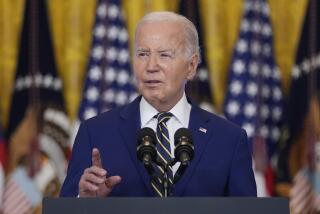Former Marine is out at rally against ‘don’t ask, don’t tell’
WASHINGTON — When President Bush stopped at the bedside of injured Marine Staff Sgt. Eric Alva in 2003 here, he was visiting one of the first Americans seriously wounded in the Iraq war.
Alva’s right leg was amputated after he stepped on a land mine near Basra on the day the ground war began.
What the president didn’t know was that Alva is gay.
Alva, who was medically discharged and awarded a Purple Heart, said he hid his sexual orientation to avoid being discharged under the law prohibiting gays and lesbians from serving openly in the military.
But earlier this year, Alva added his voice to a growing clamor from veterans and others calling for an end to the “don’t ask, don’t tell” policy. And on Friday on the National Mall, he pressed his case at a gathering of groups calling for its repeal.
“It is time for this country to move forward like the rest of the world and stop oppressing people for who they are,” Alva said at the event, which coincided with the law’s 14th anniversary.
In recent years, more than 3,600 soldiers have been discharged under the policy, according to the Defense Department. An analysis of department statistics by the Servicemembers Legal Defense Network, an advocacy group providing legal services for those discharged under the policy, found that since the edict took effect, it has led to the dismissal of more than 11,000 men and women.
And a 2005 report by the Government Accountability Office found that those discharged included some with expertise in intelligence operations or knowledge of Arabic, Farsi or Korean.
“We have a war on terror that is critical for our nation’s future, and yet we are turning away brave patriots who want to serve our country,” Patrick Sammon, president of the gay-rights advocacy group Log Cabin Republicans, said at Friday’s rally. “We’re kicking out people with key skills that can help us win the war on terror.”
The policy’s proponents say it maintains unit cohesion by limiting the discomfort some soldiers may feel about a comrade’s sexuality.
The issue was spotlighted at Wednesday’s CNN-YouTube Republican presidential debate when Keith Kerr, a retired general who is gay, asked the candidates why they did not support homosexuals serving openly in the armed forces. The four candidates responding to the question -- including Sen. John McCain of Arizona, a former naval pilot held prisoner during the Vietnam War -- cited its backing by various military leaders.
All the Democratic presidential candidates have said they support repealing the policy.
Kerr’s question created controversy when it was learned, after the debate, that he was a member of an advisory committee for Democratic White House contender Sen. Hillary Rodham Clinton of New York.
As part of Friday’s event, a letter signed by 28 retired, high-ranking military officers was released, calling on Congress to get rid of “don’t ask, don’t tell.”
Alva, in an interview after his speech, said that during his 13 years in the military, he told some fellow soldiers about his sexuality. He said two soldiers who knew he was gay were in his convoy the day he was injured.
“In every . . . duty station, there were people who knew I was gay,” said Alva, 36. “And we functioned as a unit together. We functioned as a unit respectfully.”
If Congress or the president were to ask soldiers to serve alongside their openly gay comrades, Alva said, most service members would probably not object -- they would simply follow their orders.
Alva, who lives in San Antonio and is studying for a degree in social work, said he was proud to don a new uniform as an activist and expressed confidence his cause would prevail.
“The tides are turning in this country,” he said.
--
More to Read
Sign up for Essential California
The most important California stories and recommendations in your inbox every morning.
You may occasionally receive promotional content from the Los Angeles Times.










